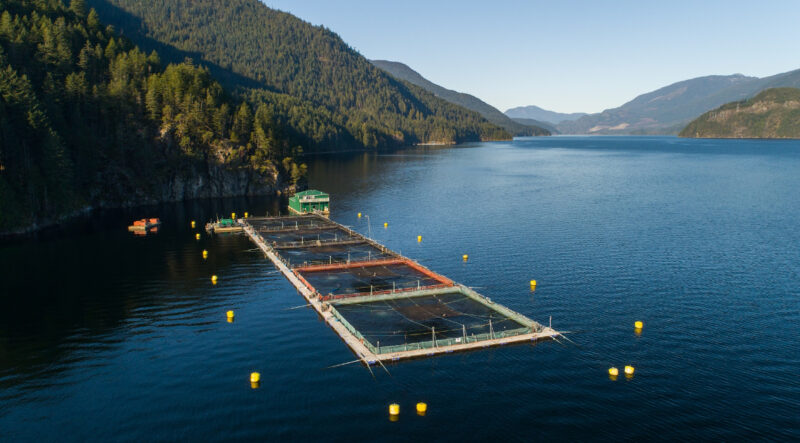Grieg Seafood BC looks for new salmon farming sites
Grieg Seafood BC seeks to develop new sites better suited for salmon farming as it works with First Nations to chart the future of aquaculture in their traditional territories
By Samantha Bacchus McLeod
SeaWestNews
Grieg Seafood BC Ltd. will decommission its operations in BC’s Sunshine Coast as part of a restructuring plan to seek better salmon farming sites, while collaborating with First Nations to chart the future of aquaculture in their traditional territories.
The decommissioning of its open-net operations in the Sechelt Inlet, to be completed by early next year, will not result in employee layoffs and Grieg Seafood BC Ltd.’s total harvesting volume targets will not be impacted, the company said in a statement.
The shíshálh Nation’s territory, located near the Sunshine Coast of BC, held eight Grieg seawater licenses. Six of those farms have previously been removed from Grieg’s production planning cycle and have been inactive as they were older, smaller sites, which were difficult to farm due to location (relatively shallow locations with warmer water temperatures and higher salinity), the company said.
“While some sites have been decommissioned, harvesting in the region has now been completed, and plans are in place to finish decommissioning all sites by early 2023”
“This work is in line with Grieg’s ongoing process of site restructuring, where the company seeks to develop sites that are well suited for salmon farming, and phase out older and smaller sites with more challenging biological conditions,” the company said.
Grieg Seafood BC operates 22 farms and a hatchery in BC, and employs 180 people in coastal communities. It is licensed to produce 23,400 tonnes salmon annually to North American and Asian markets.
“We commend Grieg Seafood for working co-operatively with shíshálh Nation through the decision making process,” said the First Nations in a press release.
“Consent-based decision making, one aspect of implementing the United Nations Declaration on the Rights of Indigenous Peoples, is a step forward and an important part of how decisions are made in the shíshálh swiya.”
Following several months of conversation with the shíshálh Nation regarding Grieg Seafood BC’s remaining two operations, and the Nations vision for their territory, a decision was reached by the Nation to remove salmon farms from their territory. Grieg reiterated that First Nations have centuries of traditional knowledge regarding their territory and “will know best about what they want to see in terms of innovation, investment, and economic development.”
Grieg Seafood BC’s parent company, in Norway, last week reported a pre-tax loss for the last quarter of USD 40.4 million, compared with a profit of USD 21 million in Q3 2021.
The company said biological challenges at its British Columbia operations, combined with inflation, resulted in higher farming costs that impacted profitability, despite higher sales revenues. The company’s farming costs in British Columbia ended the quarter at CAD 10.10 per kilo, versus CAD 8.50 in Q3 2021, and CAD 7.90 in Q2 2022.
Greig Group CEO Andreas Kvame said the company is responding to biological challenges in British Columbia by “phasing out old sites with challenging biology and high cost.”
It has also hired Jennifer Woodland as managing director for its B.C. operations. Previously, Woodland worked as CEO of Nuu-chah-nulth Seafood, and chaired the Canadian Aquaculture Industry Alliance.
Greig’s decommissioning of its Sunshine Coast operations follows the recent tour of aquaculture operations in BC by Federal Fisheries Minister Joyce Murray, who met with First Nations, industry and community leaders.
The engagement tour is part of the Department of Fisheries and Oceans (DFO) process as it works on a transition plan to determine the future of salmon farming in BC.
The Trudeau Liberals, in a pre-election pledge, had said it will come up with a plan to transition open-net aquaculture operations in BC by 2025.
Minister Murray has moved that timeline up saying she will have a transition plan in place next year, and a new licensing regime devised by June 2024.
The Federal Government has acknowledged that the future of salmon farming in British Columbia will largely depend on First Nations who want the aquaculture operations in their traditional territories.
Currently, 20 BC First Nations have partnership agreements for farming salmon in their territories, and these are producing 78% of all salmon farmed in the province. Aquaculture is B.C.’s largest agricultural export and its production represents 60% of Canada’s total salmon production.
A recent economic analysis, by the Coalition of First Nations for Finfish Stewardship (FNFFS), showed the direct economic benefits from salmon farming to First Nations in coastal BC exceed $50 million annually through more than 276 full time jobs, benefit payments, and contracts with indigenous-owned companies.
In total, when indirect and induced economic activity is factored in, First Nation interests in BC’s farmed salmon sector, on and off reserves, are estimated to generate $83.3 million in economic activity, $47.8 million in GDP, and 707 jobs earning $36.6 million in wages per year.
(Photo of one of Grieg Seafood BC’s Sunshine Coast farms)

